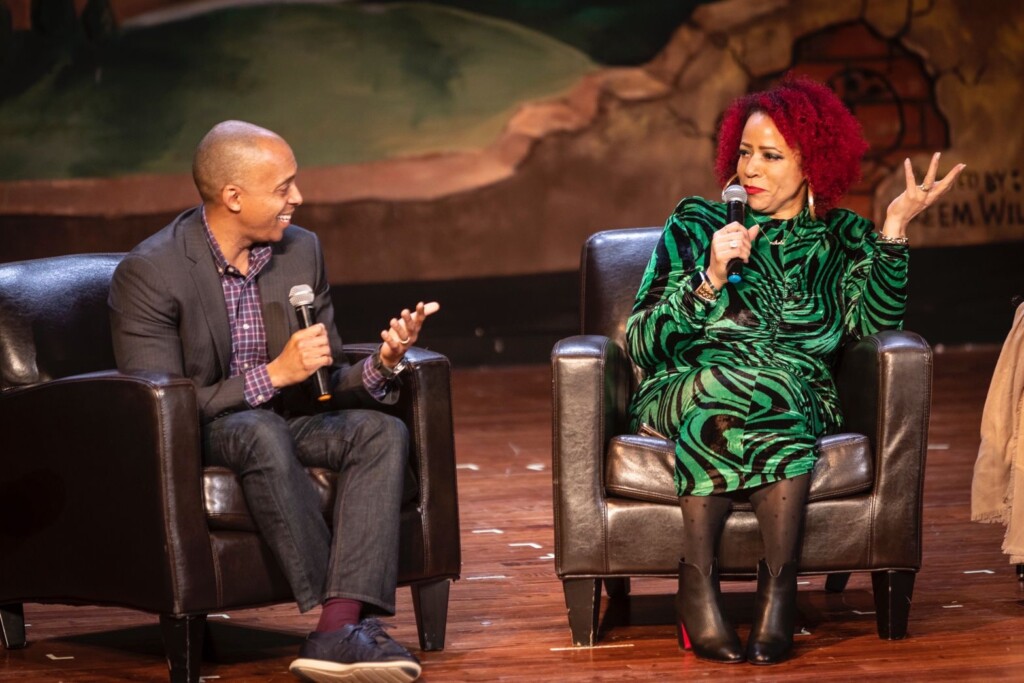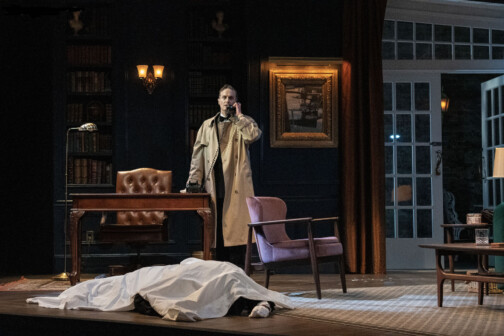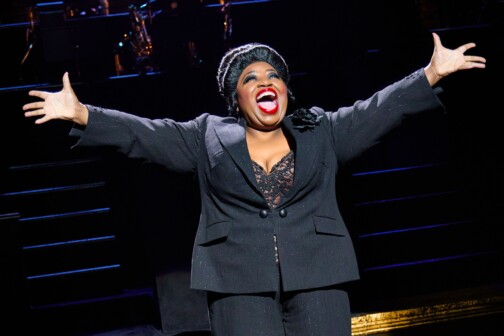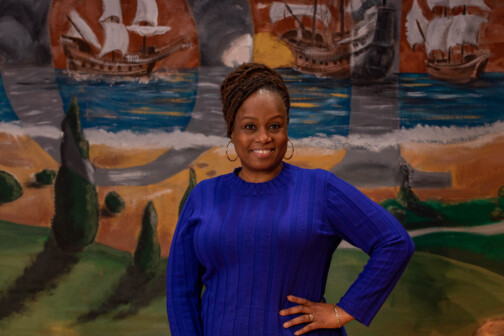The sell-out crowd filed into the intimate auditorium of the Bishop Arts Theatre for intermission last Friday. In the lobby sat an unoccupied table that displayed The 1619 Project: A New Origin Story, the work that influenced the show everyone was here to see: nine one-act plays exploring themes from the Pulitzer Prize-winning essay turned book turned podcast and streaming show.
It was Friday, the second weekend of the theater’s 1619 Project One Act Play Festival. The show has been welcomed by the community, said Teresa Coleman Wash, Bishop Arts’ executive artistic director. The author and journalist Nikole Hannah-Jones was on Tyler Street to see the production firsthand.
She finds it hard to believe her 1619 Project has inspired so many people in so many ways. She stood and clapped alongside the rest of the audience as the actors bowed after finishing the final piece.
“It was an honor to see that there would even be a festival like this built around the project,” Hannah-Jones said in the green room behind the stage. “To see all of the creative interpretations and the type of thought and storytelling that the project inspired, I, myself, found it really inspiring.”
All the publicity has been overwhelming, she said. The book was published in November 2021, the Hulu show started streaming in January, and now there was one-act play festival being staged by a community theater in Dallas. She said it is hard to believe it all started with an essay first published in August 2019 in the New York Times Magazine.
“I didn’t even know when I pitched the project if anyone would care,” she said. “It was just a project I felt I had to do. But it is the most intensely gratifying work I have ever done.”
Of all the one-act plays, Hannah-Jones found “The Origin of Freedom” especially moving. One actor reads the Declaration of Independence while wearing an American Revolution-era costume. Two other actors interjected with heckles over the hypocrisies of the freedom the document proclaimed and the oppression that followed.
She also mentioned “Ingrained,” a play about aliens that discover the atrocities of racism, and “They Would Not be Butchered,” another piece about the Haitian revolution.
Reflecting on “The Origin of Freedom,” she said it closely mirrors the goal of the 1619 Project: to point out America’s paradoxical founding on principles of liberty while upholding institutions of subjugation.
“It had so much emotional resonance,” Hannah-Jones said.
More so now. On Feb. 16, the Thursday before Hannah-Jones attended Bishop Arts’ one-act play festival, Texas Gov. Greg Abbott delivered his state of the state address. He expressed a desire to push out what he called a “woke agenda” from the classroom.
His speech is part of a familiar national pushback from many conservative politicians regarding the teaching of American history since the release of the 1619 Project. It is a sentiment Hannah-Jones knows well.
“What is clear is when someone like Governor Abbott says children should not be indoctrinated, that, as is so often the case, what he actually means is we are going to do that exact thing we say we don’t want to happen,” she said. “The way you don’t indoctrinate children is to expose them to a broad segment of ideas, not to restrict knowledge and learning.”
Some have defined the matter as a ‘culture war’ to be waged in school board meetings and libraries nationwide. But Hannah-Jones, no stranger to Abbott’s stance on the 1619 Project, sees the political posturing as proof of her work’s legitimacy.
“To a large degree, you can judge the impact by all the power that is aligned against it,” Hannah-Jones said. “It’s being legislated against … You don’t do that for something that is not having an impact, that you don’t feel is changing a narrative or understanding.”
But that remains only part of the project’s legacy. To Hannah-Jones, what stands out are spaces like the Bishop Arts Theatre Center choosing the 1619 Project as inspiration for a piece of community theater. It says that the public is willing and ready to engage with the narratives that defined the past and still affect the present, right down to individual neighborhoods. And it is only through a willing interaction with those stories that the future can improve.
“Ultimately, what I hope the legacy of the 1619 Project will be, will be spaces like this, where a multi-racial group of people comes together to collectively confront our history,” Hannah-Jones said. “That, to me, is what, when I think about legacy, not focusing on the people who are trying to discredit or legislate against the project, but instead focusing on how many Americans actually want to have a truer understanding of our country.”
Author







